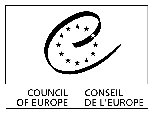Warsaw, 4 November 2005
LAUNCH MEETING OF THE
FORUM ON THE FUTURE OF DEMOCRACY
Warsaw, 3-4 November 2005
Conclusions by the Chairman
General conclusions
1. The task of the Council of Europe Forum on the Future of Democracy is to promote the strengthening and development of democracy. The Forum process, with its annual meetings, should thus support the development of proposals that address the different challenges to democracy in Europe, on the basis of a collective examination of existing policies and initiatives. The Forum proposes that the Council of Europe and its member states should disseminate good practices and other proposals in the broadest possible way.
2. The Forum acknowledges that the future of democracy in Europe is intrinsically connected to the legitimacy and efficiency of representative democracy at all levels. Addressing the causes of declining confidence and engagement in representative democracy requires the implementation of policies that aim to increase trust in democratic institutions and the political class.
3. The Forum process should therefore provide practical tools for policy makers, practitioners, think tanks and academia, as well as for NGO working in the field, so that they can interact, develop new instruments, and evaluate their effectiveness.
4. The evaluation of instruments in the field of democracy should be an ongoing process, extending beyond their adoption and implementation. This should be an integral part of policy making and will require close cooperation from the outset.
5. Norms for the promotion of democracy should cover citizens access to information, and access to the media by the political actors at all levels.
6. The role of the Forum should provide a platform for an exchange of good practices, based on the principle of peer review, to allow the interested parties to compare and discuss the usefulness and effectiveness of policies, practices and institutions which aim to strengthen democracy.
7. The programme of the next Forum should include a brief report on the work and proposals of the previous Forum meeting and its follow-up.
8. Bearing in mind the decisions of the Third Summit of the Council of Europe, the Forum for the Future of Democracy could help develop closer relationships between the Council of Europe and the European Union.
Conclusions on the specific theme of the launch meeting: civic participation
9. For European citizens, civic participation means first and foremost to exercise the right to vote. Electoral turnout thus remains one of the crucial benchmarks of civic participation, the credibility of political systems and their democratic institutions. The Forum welcomes all initiatives that can improve the accessibility, inclusiveness and transparency of electoral systems.
10. The Forum believes that civic participation has many forms and faces and is of key importance to the future of democracy in Europe. Low or decreasing levels of civic participation, especially among the young, are a reason for concern and call for positive action on the part of governments, civil society organisations and international organisations, in particular the Council of Europe. The Forum welcomes ideas and initiatives aiming to expand civic participation, especially through new forms of engagement in public life.
11. Special attention should be given to initiatives which aim to improve participation in public life, including exercising the right to vote, in particular for excluded or marginalised groups. It is of utmost importance to better integrate foreigners, particularly at local level, who do not feel they are part of the society in which they live. The Forum welcomes ideas and initiatives that aim to fully engage all people in public life.
12. The Forum affirms that enhancing civic participation requires the creation of conditions (legal and material) for the existence, sustainability and freedom of action of non-governmental organisations (NGOs). The governments of member states should develop transparent procedures for civil society organisations to interact with and influence the workings of public authorities. Dialogue should become a cornerstone of civic participation in Europe.
13. Positive action on the part of governments, civil society organisations and international organisations, in particular the Council of Europe, should include – but not be limited to – the modernisation of electoral systems by taking advantage of new communication technologies as well as the reforms of political processes to make them more transparent and accountable to citizens.
14. The Forum welcomes policies aimed at increasing citizens’ participation in elections and referenda, by modernising electoral systems to make them more voter-friendly, without compromising the security and integrity of the electoral process. In this respect, special attention should be given to initiatives improving access to voting and to information, in particular for the disadvantaged groups of the population.
15. The rise of Internet technologies has created a vast space of opportunity for public deliberation and dialogue through various forms of ICT applications. New technologies for e-voting and e-participation can create a better environment for transparency and accountability of political processes.
16. Encouraging civic participation of young people requires the serious attention of policy makers and civic activists. This should involve a modification of both the style of politicians and the substance of politics as well as new civic education initiatives, both within and outside the educational system. Special attention should be given to schools, which should become authentic, modern centres of democracy learning for the young, who, in turn, will be responsible for European democracy in the future.
17. The Forum invites the Council of Europe as well as interested member states and organisations to initiate the preparation of a review paper, by open-ended working groups, on the state of civic participation in Europe. This paper would examine and compare the experiences of different Council of Europe member states and develop proposals, such as drawing up a Code of Good Practice for civic participation. The Forum recommends that the Council of Europe should take further action to collect, examine and disseminate the experiences of the member states, with regard to policies aiming to improve civic participation.







 Print
Print  Send
Send  FRANCAIS
FRANCAIS 
